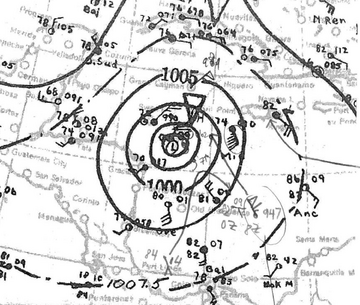1932 Cuba hurricane facts for kids
| Category 5 major hurricane (SSHWS/NWS) | |

Surface weather analysis of the hurricane at its peak intensity on November 8, southwest of Cuba
|
|
| Formed | October 30, 1932 |
|---|---|
| Dissipated | November 14, 1932 |
| (Extratropical after November 13, 1932) | |
| Highest winds | 1-minute sustained: 175 mph (280 km/h) |
| Lowest pressure | ≤ 915 mbar (hPa); 27.02 inHg |
| Fatalities | ≥3,103 direct (Deadliest in Cuban history) |
| Damage | $40 million (1932 USD) |
| Areas affected |
|
| Part of the 1932 Atlantic hurricane season | |
The 1932 Cuba hurricane was a very powerful and deadly storm. It was the worst hurricane to hit Cuba at that time. This storm was also special because it was the only Category 5 Atlantic hurricane ever recorded in November. Category 5 is the strongest type of hurricane.
The hurricane caused a lot of damage and sadness. More than 3,000 people died in Cuba. The storm also caused about US$40 million in damage. This was a huge amount of money back then.
Contents
What is a Hurricane?
A hurricane is a giant, spinning storm. It forms over warm ocean waters. Hurricanes have very strong winds and heavy rain. They can also cause storm surge. This is when the ocean water rises above its normal level. It then floods coastal areas.
How Hurricanes Form
Hurricanes start as tropical depressions. These are areas of low pressure with some thunderstorms. If the conditions are right, they can grow stronger. They become a tropical storm when winds reach 39 miles per hour (63 km/h). If winds get even faster, they become a hurricane.
Hurricane Categories
Hurricanes are put into categories from 1 to 5. This is based on their wind speed.
- Category 1: Winds 74-95 mph (119-153 km/h)
- Category 2: Winds 96-110 mph (154-177 km/h)
- Category 3: Winds 111-129 mph (178-208 km/h)
- Category 4: Winds 130-156 mph (209-251 km/h)
- Category 5: Winds 157 mph (252 km/h) or higher
The 1932 Cuba hurricane reached Category 5 strength. This means its winds were incredibly fast and destructive.
The Storm's Journey
The 1932 Cuba hurricane started on October 30, 1932. It formed in the southern Caribbean Sea. The storm moved west and quickly grew stronger.
Path Through the Caribbean
As it moved, the hurricane passed near the Lesser Antilles. These are a group of islands in the Caribbean. It then headed towards Jamaica and the Cayman Islands. These islands also felt the storm's power.
Impact on Cayman Islands
The Cayman Islands experienced strong winds and heavy rains. Many homes and buildings were damaged. Boats were also destroyed in the harbors. People had to rebuild their lives after the storm passed.
Hitting Cuba
The hurricane reached its strongest point as it approached Cuba. It hit the island on November 9. The storm made landfall in the central part of Cuba. This area is called the Camagüey Province.
Devastation in Cuba
When the hurricane hit Cuba, it brought extreme winds and a huge storm surge. The storm surge was especially bad along the coast. It washed away entire villages. Few buildings were strong enough to stand against the storm. Homes, schools, and hospitals were destroyed. Roads and bridges were also ruined. This made it hard for help to reach people.
The storm also destroyed many crops. Cuba relies on farming, especially sugar cane. The loss of crops made it even harder for people to recover.
Later Stages of the Storm
After leaving Cuba, the hurricane moved north. It weakened as it went over cooler waters. It passed near the Bahamas and Bermuda. These areas felt some effects, but not as bad as Cuba. The storm finally ended on November 14, 1932.
After the Storm
The 1932 Cuba hurricane left a lasting mark. It showed how dangerous hurricanes can be. The recovery in Cuba took a long time. People worked together to rebuild their homes and communities. This event helped people understand the importance of preparing for future storms.
Images for kids
See also
In Spanish: Huracán de Cuba de 1932 para niños
 | Dorothy Vaughan |
 | Charles Henry Turner |
 | Hildrus Poindexter |
 | Henry Cecil McBay |


